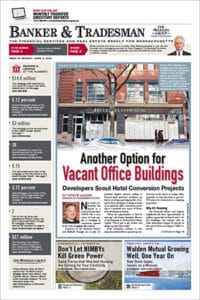
Doug Quattrochi
A hearing scheduled for Oct. 12 will decide whether Massachusetts renters may have a “right of first refusal” on their building. Although benign-sounding, the two bills being heard would literally destroy rental housing through their provisions for “small amounts of demolition,” among other draconian measures.
Advocates for the proposal argue that too often multifamily housing is sold conditional upon units being rendered vacant. The resulting displacement injures especially elderly and low-income renters. Because so much of our commonwealth is zoned for single-family homes with large minimum lot sizes, there is no place for such renters to go. They are displaced far from their home. We agree, this is a bad situation.
The bills propose that renters should become landlords. Well, we’d welcome them as MassLandlords members! Sadly, that’s where our shared interests end.
‘Small Amounts of Demolition’
A primary component of the right of first refusal is lengthy closing times. Any town or city that adopts the law would have to allow at least 220 days to close a multifamily, if required by the renters. Under certain conditions, lawyers can argue for extensions. Renters can also hold owners over a barrel to agree to “voluntary” extensions.
Ostensibly, delays help newly formed associations of tenants secure financing. In practice, it will serve to discourage investors from shopping in that town or city’s market. Why would anyone risk a year-long closing process when the next town over offers multifamilies that close in 30 days? The intent is to beat down owners in price.
If a 220 day close has your head shaking, then the demolition clause will make your blood boil. Under the law, renters looking for lead and asbestos are allowed to conduct “small amounts of demolition.” I hope what the bill drafters meant was “destructive testing.” What they wrote, however, is very different.
Have you ever heard of a prospective buyer swinging a hammer into a wall to see if lead dust is generated? Can you imagine anything more outrageously dangerous than tearing down part of a ceiling to test for asbestos?
Under the current state sanitary code, any demolition conducted by the prospective buyer would have to be repaired immediately at the seller’s (i.e., landlord’s) expense.
Worse than D.C.
Advocates for right of first refusal have worked hard to distance themselves from the bad experience in Washington D.C., which has repealed part of their right of first refusal. NBC Washington reported average payments to renters of $10,000 per unit as landlords bought the rights. Once purchased, landlords were free to sell their properties on the market.
The proposed bills would make it illegal to buy such rights in Massachusetts. Unfortunately for these naive drafters, Massachusetts does not require owners of real estate to be identified the way banks are required to “know your customers.” This means Massachusetts is likely already experiencing money laundering through real estate, the same as Vancouver experienced billions in laundering, as reported by the BBC.
Right of first refusal will create a black market for illegally transacted rights.
Right of First Refusal is a Power Grab
Landlords by definition operate rental housing. If we’re selling rental housing, then it means we have a situation we can’t or won’t deal with. Many of us hope to retire someday or experience illness that forces us to accelerate our exit strategy. Others find the 24/7 nature of landlording is too difficult to maintain with day jobs and families.
It makes no sense that these proposed bills should force people to be landlords for a year past when they want out. The bills single out owners about to be foreclosed on. Way to kick ‘em when they’re down, renter advocates.
It should come as no surprise to readers that most renters cannot or choose not to become landlords. It therefore stands to reason that the advocates for this bill are not renters but rather third parties who can persuade renters to gift their rights to them.
The biggest advocates are the community development corporations. Last year, for instance, Joe Kriesberg, executive director of the Massachusetts Association of Community Development Corporations, contributed an op-ed to Commonwealth Magazine in favor of these right of first refusal. MassLandlords has also been approached the Jamaica Plain Neighborhood Development Corp., among others.
There is no universe where landlords will not sell to our renters. All the renters have to do is make a good offer. “220 days to close and let me demolish parts of your house” is not a good offer.
The bills are 192 S.890 and H.1426, each “An act to guarantee a tenant’s right of first refusal.” They ought not pass. Written testimony is accepted until Oct. 15.
Doug Quattrochi is executive director of MassLandlords Inc.





